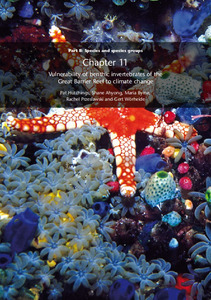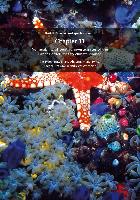Please use this identifier to cite or link to this item:
https://hdl.handle.net/11017/543

| Title: | Chapter 11: Vulnerability of benthic invertebrates of the Great Barrier Reef to climate change |
| Authors: | Hutchings, P. Ahyong, S. Byrne, M. Przeslawski, R. Wörheide, G. Great Barrier Reef Marine Park Authority |
| metadata.dc.subject.asfa: | Climatic changes Marine invertebrates Ecosystem resilience Coral reefs Biodiversity |
| APAIS Subject: | Animals Environmental management Environmental impact |
| metadata.dc.subject.location: | Reef-wide |
| metadata.dc.subject.category: | Animals Plants Ecosystems Processes Economic values Social values Climate change Coastal communities |
| Year of publication: | 2007 |
| Publisher: | The Great Barrier Reef Marine Park Authorty |
| Series/Report no.: | Book: Climate change and the Great Barrier Reef: a vulnerability assessment |
| Abstract: | This chapter deals with benthic invertebrates inhabiting the extensive inter-reef soft bottom habitats and those occurring on the reef, excluding corals. For the remainder of the chapter, the term ‘benthic invertebrate’ refers to all invertebrates excluding corals. An assessment of the impacts of climate change on non-coral benthic invertebrates poses particular challenges: i) benthic invertebrates include an extraordinary diversity of marine organisms, including many microscopic, infaunal, boring or ephemeral species that can be difficult to sample and are poorly known taxonomically; ii) benthic invertebrates employ a diversity of reproductive strategies, broadly including planktotrophy (development through feeding larvae), lecithotrophy (development through non-feeding larvae) and direct development (release of post-metamorphic juveniles), as well as asexual reproduction, making broad generalisations of dispersal capabilities difficult; iii) factors determining species distributions are poorly known for most species; iv) benthic invertebrates exhibit a tremendous variety of lifestyles and forms, including colonial, sedentary and errant species; v) many species include either a pelagic larval or adult stage, so effects of climate change may vary during their lives (see McKinnon et al. chapter 6 for comments on planktonic forms); and, vi) research on the biogeography of benthic invertebrates on the Great Barrier Reef (GBR) is strongly biased towards commercial or destructive species. |
| URI: | https://hdl.handle.net/11017/543 |
| ISBN: | 9781876945619 |
| Type of document: | Book section or chapter |
| Appears in Collections: | Effects |
Files in This Item:
| File | Description | Size | Format | |
|---|---|---|---|---|
| Chapter-11-Vulnerability-of-benthic-invertebrates-of-the-Great-Barrier-Reef-to-climate-change.pdf | 1.27 MB | Adobe PDF |  View/Open |
Items in ELibrary are protected by copyright, with all rights reserved, unless otherwise indicated.
